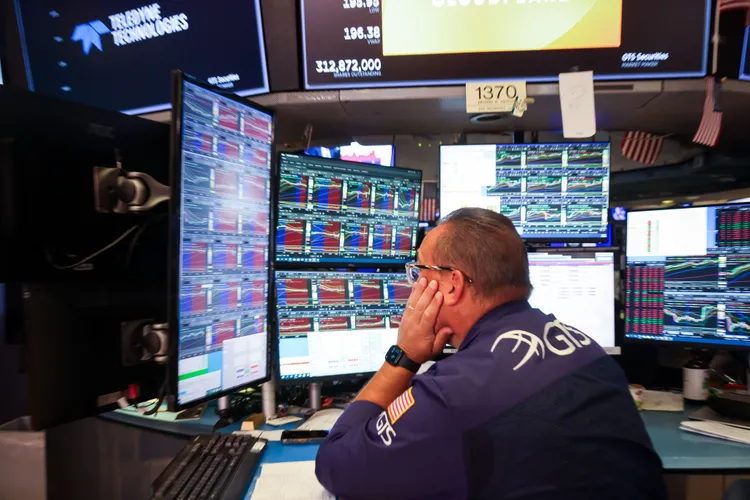U.S.–China trade tensions have flared again as Donald Trump threatened sweeping tariffs on Chinese goods, sending global markets into a tailspin. Major U.S. tech firms, including Nvidia, AMD, and Tesla, saw sharp declines as fears of a renewed trade war rattled investors. Economists warn that escalating tariff threats could disrupt global supply chains and reignite inflation pressures.
Table of Contents

U.S.–China Trade Tensions Spark Market Sell-Off as Trump Warns of Massive Tariffs
New York, October 28, 2025 — Updated 9:30 PM ET
The U.S.–China trade tensions that once dominated global headlines are back — and markets are reacting swiftly.
Major U.S. indexes, including the Dow Jones Industrial Average, S&P 500, and Nasdaq Composite, all recorded significant losses Monday after former U.S. President Donald Trump vowed to impose “massive tariffs” on Chinese imports if elected again in 2026.
“China has taken advantage of the U.S. for decades — those days will end,” Trump said during a televised rally in Ohio.
Tech Stocks Hit Hard
The tech-heavy Nasdaq was the hardest hit, sliding more than 3.8% as chipmakers and electric vehicle companies saw steep declines.
Nvidia, AMD, and Tesla shares each fell between 5–7%, reflecting investor concern over potential supply chain disruptions tied to China’s role in semiconductor production.
Meanwhile, shares of rare-earth mineral suppliers in China spiked, reflecting market speculation that Beijing could retaliate by tightening exports of critical raw materials used in AI chips and EV batteries.
A Renewed Trade War Looming
Economists warn that U.S.–China trade tensions could mark the beginning of “Trade War 2.0.”
The previous trade conflict between the two nations from 2018–2020 saw hundreds of billions of dollars in tariffs and deeply disrupted global supply chains — particularly in tech, manufacturing, and agriculture.
This new escalation could have similar consequences. Analysts predict that even the threat of tariffs could discourage cross-border investment and slow down global tech innovation.
“Markets are pricing in another cycle of uncertainty,” said Ellen Grant, senior economist at Capital Insight Research. “Every mention of tariffs shakes investor confidence.”
Rare Earths and the Tech Battle
China currently controls nearly 70% of global rare-earth mineral production, a critical component in producing advanced semiconductors, EV batteries, and AI hardware.
If the U.S. raises tariffs, Beijing could respond by restricting exports — a move that would directly affect companies like Nvidia and Intel, both heavily dependent on Chinese supply chains.
The White House issued a statement urging “measured responses,” emphasizing that diplomacy remains an option to avoid economic escalation.

Market Analysts Warn of Global Fallout
International investors are closely monitoring the U.S.–China trade tensions, with fears spreading to Asian and European markets.
Hong Kong’s Hang Seng Index fell 2.6%, while Japan’s Nikkei lost 1.8%. The Shanghai Composite also dipped as Chinese officials condemned Trump’s remarks, calling them “provocative and destabilizing.”
“This is not just a U.S.–China issue anymore — it’s a global economic concern,” said Dr. Leo Chen, an economist at the University of Hong Kong.
Impact on the AI and Semiconductor Boom
Ironically, the AI frenzy that helped Nvidia reach a $5 trillion valuation earlier this month now makes the company more vulnerable to geopolitical risks.
Experts note that heightened U.S.–China trade tensions could disrupt the delicate balance of chip manufacturing, raw materials, and cross-border collaboration that fuels the global AI economy.
“AI is the new oil — and tariffs are the new pipeline blockages,” remarked analyst Susan Patel of Bloomberg Intelligence.
Outlook
While short-term volatility is expected, some investors see opportunity amid the chaos. Defensive sectors like energy and gold surged as traders shifted to safer assets.
Still, many agree that renewed U.S.–China trade tensions could have long-term consequences on innovation, pricing, and global economic stability.
External References
- CNBC – Trump Threatens ‘Massive’ China Tariffs
- The Economic Times – Tech Stocks Fall Amid U.S.–China Trade Tensions
- Reuters – Global Markets React to Renewed Trade Threats